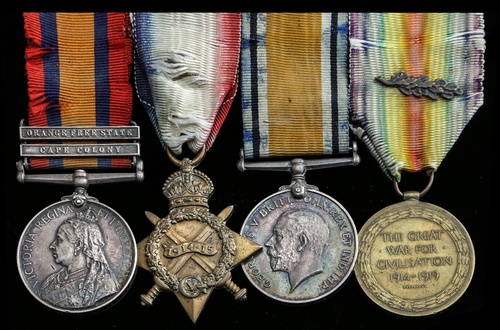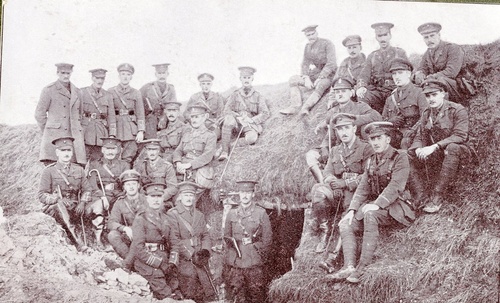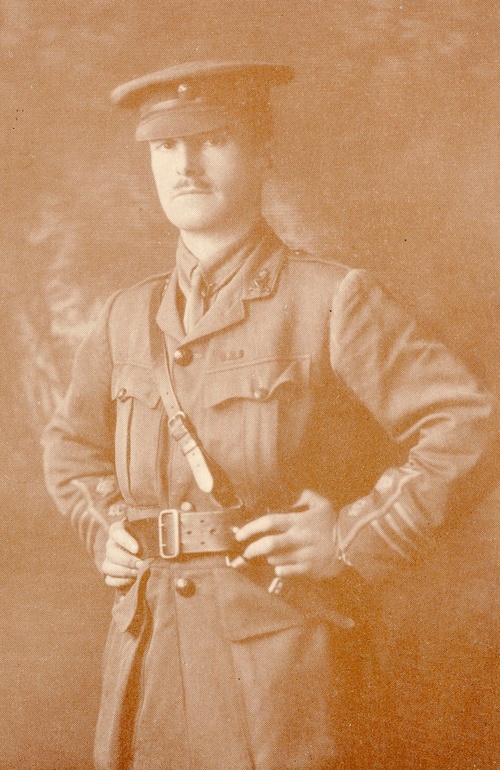Auction: 17003 - Orders, Decorations and Medals
Lot: 538
'Colonel John Leader, was above all things a modest man, for when asked about his life, he is quoted as responding: "My hideous past? Why, nothing exciting ever happened to me!" Clearly, he liked passing the fact that he had seen service with all the Allies but one, and had been an interpreter of Japanese, Chinese and German. Equally, in his book 'Oregon Through Alien Eyes', John Leader continued to state with self-deprecating humour: "When I returned, crumpled from the Boer War, I could make spirited efforts at posing as a young hero, but that era was past, and the only amusement I could get from my trailing hind leg, lay in the memory of a popular vaudeville song of my youth, describing a gentleman, who had inadvertently married a young lady with a wooden leg, and used to sing to her: "You're not a bit of use to me, You're half a woman and half a tree."'
See:
https://blogs.uoregon.edu/scua/2014/12/16/colonel-john-leader-the-man-who-prepared-oregon-for-world-war-i/
An interesting Boer War and Great War campaign group of four awarded to Colonel J. Leader, Royal Irish Rifles, late Bedfordshire Regiment, a talented linguist who saw his fair share of action, not least as C.O. of the 16th Battalion, Royal Irish Rifles (Pioneers): he took the unit to France in October 1914 and remained in command until buried by shell fire on the Somme in 1916
Queen's South Africa 1899-1902, 2 clasps, Cape Colony, Orange Free State (Lieut. J. Leader, Bedford Regt.); 1914-15 Star (Lt. Col. J. Leader, R. Ir. Rif.); British War and Victory Medals (Lt. Col. J. Leader.), rank and initial re-inscribed on the first, generally good very fine (4)
John Leader was born to Irish parents in Quetta in 1877 and was destined to follow a long line of military men, his father, Surgeon-Major John Leader of the 19th Regiment, among them. The previous fourteen generations of 'Leaders' derived from an old moated hall at Keale in Cork; the family name had been 'Temple' until the Battle of the Boyne, whereupon Prince William of Orange renamed John Temple of Keale, 'Leader'.
Young John was educated at Wellington College, where he excelled at sport and captained the hockey, polo, soccer and lawn tennis teams. Having then attended Sandhurst, he was commissioned in the Bedfordshire Regiment. A linguist of some standing, his first military assignment was to Germany in 1896, where he served as an interpreter. He subsequently witnessed active service in the Boer War, serving as a Lieutenant in the Mounted Infantry in operations in Cape Colony and Orange Free State (Queen's Medal & 2 clasps).
From South Africa he was posted to China, where he acquired the position of interpreter and, on the outbreak of the Russo-Japanese War, he was once more detached from regimental employ to teach Mounted Infantry tactics. He was destined to return to the Far East once more, as an interpreter of Japanese, whilst in 1908 he is stated to have 'fought in Arabia, distinguishing himself in the field.'
Leader retired from military service in 1909 and relocated to Vancouver, British Columbia, with his new English wife, Evelyn Pleydell-Bouverie, daughter of the former commander of the 17th Royal Lancers, and niece of the Earl of Radnor. It was here that they started a family and began an import-export business, but with the outbreak of war, Leader immediately returned to England.
The Great War
Initially appointed a Captain of Staff at Headquarters, he was soon promoted to Lieutenant-Colonel, taking command in October 1914 of the 16th Royal Irish Rifles within General French's Ulster Division. In 1916 he was severely wounded when his position at Aveluy Wood was hit by thirteen German shells, causing the dugout in which he was sheltering to collapse; Leader was crushed under the walls and was evacuated to England.
For full details of his battalion's trials and tribulations in the period 1914-16, see the recipient's memoirs; The Terrors, by Lieutenant-Colonel S. N. White, and:
http://www.wartimememoriesproject.com/greatwar/allied/battalion.php?pid=872
Of subsequent events, Leader takes up the story:
'When the Powers that be decreed my physical incapacity to return to the Bull Ring of Flanders, three prospects dangled before my dazzled eyes, one administrative and carrying the shekels, but dooming me to be a non-combatant soldier, another to command an English "Officer's Training Corps", carrying with it the certainty of advancement in rank, and the third to command the O.T.C. of a Western University, which carried neither much salary nor prospects of promotion, but involved a fifty-fifty chance of more active service; by the grace of God, I chose the right one, and left the general hospital at Cambridge to cross over to the States.'
In the Autumn of 1916, the University of Oregon wrote to the British War Office asking for a man to drill its troops. Selecting Leader from a list of suitable men, the President of the University, Prince Lucien Campbell, greeted Leader and his family on 17 December 1917 and set him to work training a University Battalion for the War Effort. It was a highly successful appointment:
'In two weeks he had guns for the troops, had made arrangements for the only kind of uniforms practicable, and had the men drilling an hour a day, with four hours on Saturdays and lectures on three days a week. According to the student body, he was "A demon for work," and his lecture course programme, the 'Invasion of the Pacific Coast' made him famous, or notorious, all over Oregon. In the complete captivation of the students of the University, "Colonel John," as he was affectionately named, 'is well-nigh idolized, and there is not a member of the Battalion who wouldn't follow him into the thickest fight on the Western Front. The Colonel's thorough friendliness, his impulsive enthusiasm, his restless energy, his genuine humour, these and other admirable traits have won for him a high place in the hearts of students, faculty and friends of Oregon. If the Great War has done no other good thing, at least we can be grateful that it brought Colonel John to the University.'
Leader was subsequently named an honorary Colonel of the Oregon National Guard for his service to the State.
Postscript
Following the Armistice, Leader retired from the University and returned to Vancouver, serving for a period as President of the American Pacific Export Company. In the 1920s he became involved in the Chautauqua movement in Canada, being a prominent promoter and lecturer, notably across Australia and New Zealand. The Chautauqua brought entertainment and culture to the whole community, with speakers, teachers, musicians, entertainers, preachers, and specialists of the day. Former U.S. President Theodore Roosevelt was quoted as saying that Chautauqua is "the most American thing in America." No doubt this would have appealed to the 'thoroughly Irish' Colonel Leader.
In 1922, he produced a memoir about his time at the University of Oregon, Oregon through Alien Eyes, before settling down to raise his growing family, now swollen by three sons. However, as before, with the outbreak of the Second World War, Leader once again returned to London, whereupon he was attached to the Intelligence Division, with direct contact to Charles de Gaulle.
Leader died at his home in Vancouver on 8 March 1967, aged 90.
Sold with a quantity of original documentation and photographs, including a family photograph album and scrapbook; a pair of signed presentation photographs from dignitaries known to the recipient from his service in Japan in 1906; and original music sheets (2), 'Col. Leader March', by Albert Perfect, dedicated to the recipient and published by The Mighty Oregon Publishing Co.
Reference sources:
Oregon Through Alien Eyes, John Leader (Meier and Frank, Portland, 1922).
https://blogs.uoregon.edu/scua/2014/12/16/colonel-john-leader-the-man-who-prepared-oregon-for-world-war-i/
https://en.wikipedia.org/wiki/Chautauqua
Subject to 20% VAT on Buyer’s Premium. For more information please view Terms and Conditions for Buyers.
Sold for
£1,400









